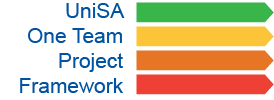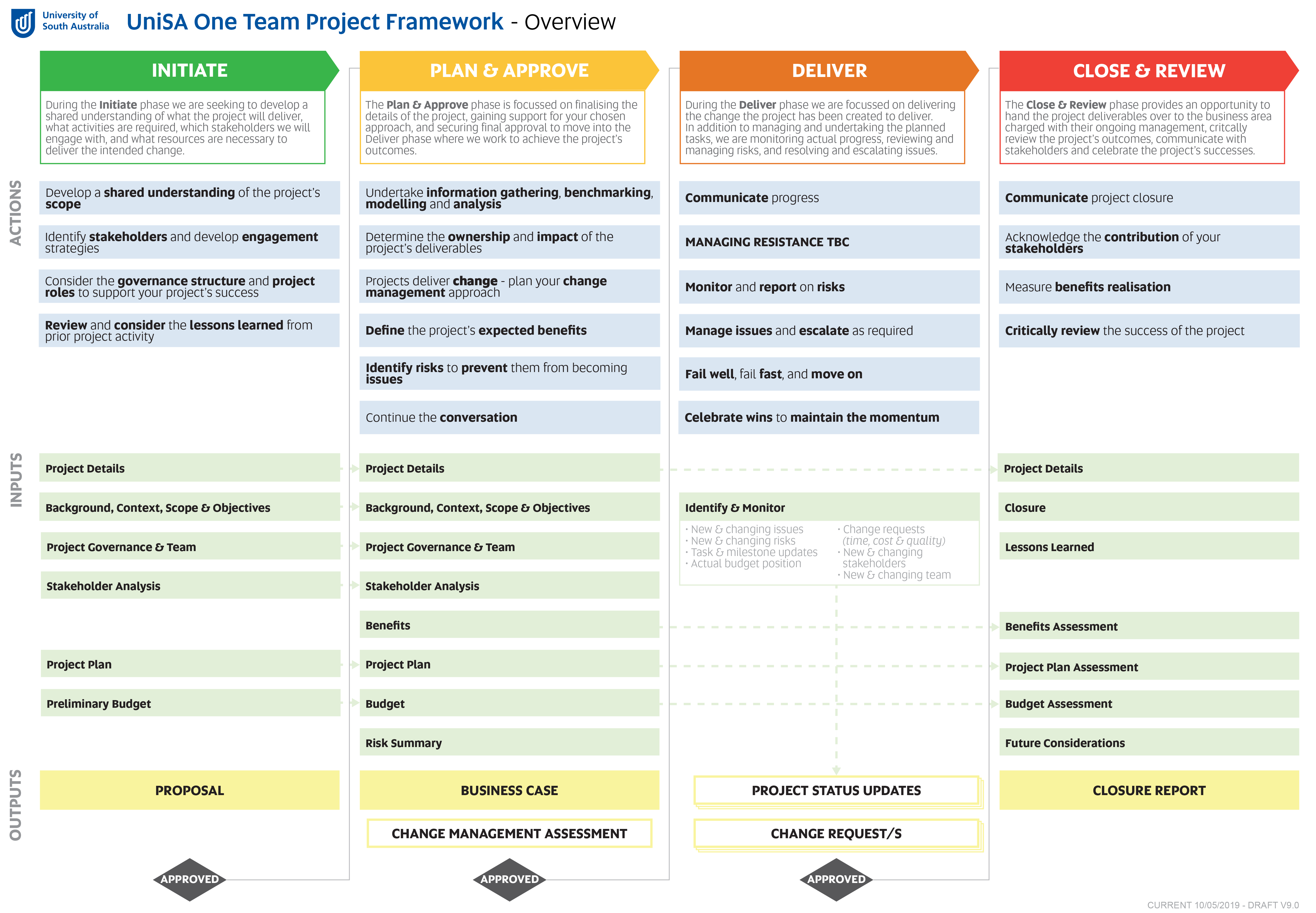
Overview
The UniSA One Team Project Framework (OTPF) has been developed to provide all staff with the knowledge and tools to initiate, plan and approve, deliver, and close and review projects in the support of the university delivering successful outcomes for its stakeholders.
The OTPF does not seek to prescribe an approach, rather it aims to provide a best practice methodology enabling consistency and transparency, and supports the development of project management capability across the organisation. The framework also seeks to support the university’s one team approach to collaboration and enterprise support encouraging staff to work across organisational boundaries.
Whilst staff are encouraged to use the framework to enable a consistent approach to project management, the OTPF empowers staff to use those tools, techniques and methodologies that they believe will support the delivery of successful outcomes for their stakeholders and the organisation as a whole.
One Team Project Framework

Approach
The OTPF is based on a range of project management methodologies, including PRINCE 2, PMBOK and Agile, but has been customised to best support the project activity undertaken at UniSA and balance the needs of users, stakeholders and decision makers.
Like most project frameworks, the OTPF is based around a phased approach. The use of phases has the following benefits: they ensure that we consult and plan our projects before we commence activity, they enable a scalable approach whereby a detailed business case is only developed if the project has wide support, and they provide control through decision ‘gates’ between phases that require approval to proceed with the project.
The 4 phases that make up the OTPF, and the purposes they serve, are detailed below:
- During the Initiate phase we are seeking to develop a shared understanding of what the project will deliver, what activities are required, which stakeholders we will engage with, and what resources are necessary to deliver the intended change.
- This is primarily achieved through consultation with internal and external stakeholders and supported by research and analysis.
- The Proposal output from this phase should be viewed as a kind of ‘pitch’; a persuasive, cohesive and concise summary of the intended project that enables its endorsement and approval before more detailed development work is undertaken in the Plan & Approve phase.
- The Plan & Approve phase is focussed on finalising the details of the project, gaining support for your chosen approach, and securing final approval to move into the Deliver phase where we work to achieve the project’s deliverables.
- The activities in this phase include finalising the project’s scope, identifying and quantifying the project’s expected benefits, developing a governance group to oversee progress of the project, identifying risks and developing mitigations, determining the overall project budget.
- The other critical aspect of this phase is the development of a Change Management Plan. Given that all change impacts its stakeholders, ensuring that a suitable overall change management approach has been considered and reflected in the project is essential to the successful delivery and adoption of project outcomes.
- The overall project is detailed in the Business Case output which needs to provide a sufficient of level detail for final approval of the project, in turn, triggering the commitment of university’s resources.
- During the Deliver phase we are focussed on delivering the change the project has been created to deliver.
- In addition to managing and undertaking the planned tasks, we are monitoring and reporting actual progress against our plan, reviewing and managing risks, and resolving and escalating issues.
- In addition to continuous engagement with your stakeholders, the Project Status Report output provides a consistent and concise way to ensure your governance group is kept up to date.
- Another key activity is the escalation of those changes that will significantly impact the overall scope (time, cost or quality) of the project via the Change Request output.
- The Close & Review phase provides an opportunity to hand the project deliverables over to the business area charged with their ongoing management, communicate with stakeholders and celebrate the project’s successes.
- Critically, we also review the expected benefits against the actual outcomes to assess the project’s overall success, and consider those lessons learned over the course of our work so that they can be shared and applied to future projects.
The One Team Project Framework tools and outputs are available on the OTPF SharePoint site.

